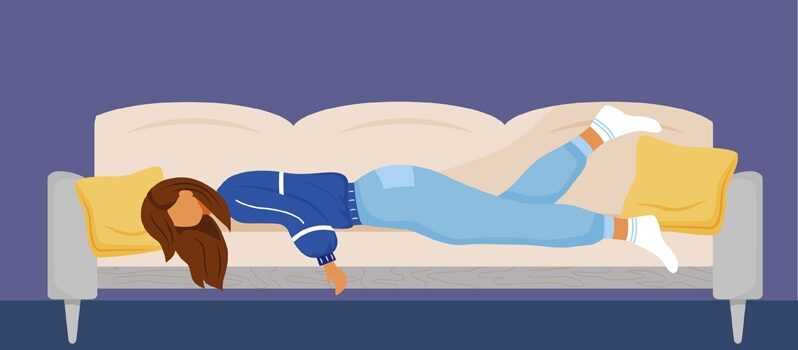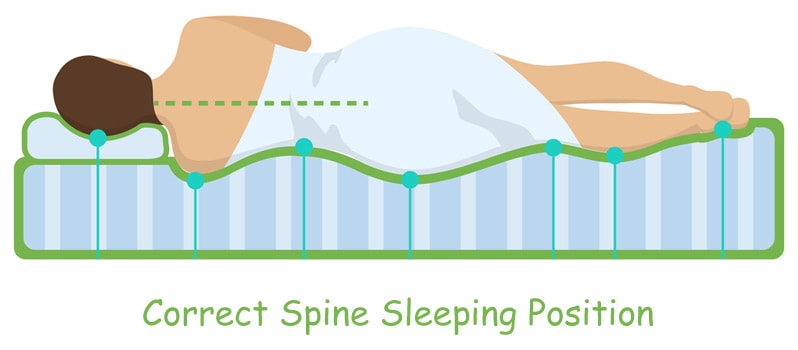Why It’s a Bad Idea to Fall Asleep On a Couch

There are many reasons why it’s a bad idea to fall asleep on a couch. A simple one to understand is that a couch or sofa is designed for sitting on, not for sleeping on! Mattresses are designed specifically for sleeping on, and many are designed or recommended particularly for people who sleep in specific positions: on their side, back or stomach.
If you sleep on a couch, your body is not properly supported. Your spine can be out of position, there may be excess pressure on specific pressure points (shoulders, hips, arms, knees), and your neck can be badly supported. Any of these can lead to severe orthopedic problems and associated pain. Here are some specific reasons why it’s a bad idea to fall asleep on a couch.
Mattress foams and innersprings are designed specifically for sleeping on. Many, such as memory foams and other responsive foams are constructed to conform to your body shape while providing overall support for your pressure points. Many, such as gel foams, or foams built with air pockets, help control your temperature and keep you cool during the night.
Foams and springs used in couches are not designed in this way. They are built for sitting on: to support your body weight focused on the much smaller area of your buttocks. The springs and foams used in a couch are firmer than those used in a mattress. They are generally unable to absorb the pressure on your shoulders and hips or to keep your spine straight from the top of your neck to the base of your spine. Even if you prefer a firm mattress to a soft one, the couch is still too firm for sleeping.
Support for Your Spine: Your spine should take the form of a perfectly straight line from top to bottom when viewed front the front or back. It should also form of an ‘S’ shape when viewed from the side. A couch is not designed to support your spine in this way. If you sleep on your side on a couch your spine it will not be supported correctly and will tend to be bent sideways. If you sleep on your front or back, your lumbar region, the lower bend of the ‘S’, will tend to straighten, again leading to pain.

Orthopedic Issues: Through time, if you habitually sleep on a couch, your spine can suffer structural changes. Among the possibilities are degeneration of your disks and joints and changes in the length of the ligaments and muscles (becoming shorter or unduly stretched). These, allied to accelerated cartilage wear, can lead to extreme chronic back and neck pain. These pains tend to develop over a period of time and require months of specialist orthopedic or chiropractic treatment to relieve.
Importance of a Pillow: The importance of a pillow is often overlooked. A pillow is necessary in order to keep your neck in proper alignment with the rest of your spine. Even if you do use a pillow when sleeping on a sofa, your neck will likely be positioned wrongly to get the support it needs.
The two major issues why it’s a bad idea to fall asleep on a couch are i) that you cannot always stretch out straight from your head to your feet, and ii) that your body is in the wrong position for healthy sleep. Add to that a poor level of support and the poor type of support, and conditions are almost perfect for chronic neck and back pain.
When you sleep in your bed on a proper mattress, you can generally move around when sleeping. Many people roll over or change their sleeping position during the night. It can be very difficult to adjust your sleeping position when sleeping on a couch. If your body feels too much continuous pressure on a specific area, it will tend to move to relieve that pressure.
That cannot always happen when you are sleeping on a couch due to the way it may restrict your movement. The result is not only excessive pressure on certain parts of your body but also disturbed sleep. You may wake up in pain, or your sleep may be disturbed. If you are in an uncomfortable position, you may awake and be unable to get back to sleep, or sleep through it and wake up in the morning unrefreshed, tired and in pain.
You will also likely be unable to enter into the latter stages of sleep where your brain and body are regenerated and you are ready to face the world again. You may wake up still tired and irritable, and be unable to concentrate during the day as well as you should. Students studying for an exam the next day should make sure that they get to bed and do not fall asleep on the couch!
So what is it about a couch that makes it a bad idea to use it for sleeping? Is it the design (would a longer sofa be better) or the materials it is made from. It is certainly true that if you must sleep on a couch, then it would be preferable for it to be at least long enough to accommodate the full length of your body.
However, a couch is extremely unlikely to be able to properly support your body and provide pressure-relief for your pressure points. As stated above, the materials used in its construction are too hard to be suitable for a bed. Many people find it difficult to sit on the side of a mattress that has not been fitted with side support for that purpose. That’s because a mattress is not constructed to support the weight of the body when focused on a small surface area.
It can, however, support your body properly when its weight is spread over your whole body when lying flat. If you sleep on your side, you may need slightly more support then on your back or belly – that’s why there are so many different types of mattress available.
A couch is harder. It’s good for sitting on but not so good for lying on. It might be OK for an hour or two, but not all night. You will probably wake up each time you try to adjust your body position. Your body is fundamentally not aligned properly on a couch, leading to the issues detailed earlier.

Here are four of the most common questions we have been asked regarding sleeping on a couch.
Sure – if only for an hour or two at the most. But why would you do this? Are you getting sufficient sleep during the night for you to feel so tired while watching TV? We wouldn’t recommend it, but if you go to bed at your normal time, it shouldn’t harm you. What may harm you is it becomes a habit, and you get knocked off your regular sleeping routine.
No, it’s not OK! The issue here is that your couch has not been designed for sleeping on. The surface is sure to be too hard for sleeping, even though it is comfortable to sit on. You need a softer sleeping surface to properly support your body and its pressure points while you are asleep. So no – it is not OK!
The sofa bed is fitted with a mattress designed for sleep. You do not sleep on the sitting surface of the couch, but on a mattress that is incorporated into the sofa bed once it has been converted to a bed. This might not be as high quality a mattress as you can get on a regular bed, but it is suitable for occasional use – certainly more suitable than the sofa or couch itself.
Correct! The sofa is designed for sitting on while the sofa bed is designed for sleeping on. Both surfaces are different. Don’t try to use one for the other. The sofa bed will not be comfortable to sit on watching TV, and the sofa won’t be comfortable to sleep on.
Finally: What we are saying here is that a couch or sofa is not suitable for sleeping on and that the bed is not suitable for sitting on. Each has its own intended use that is engineered into its design. Use a couch for sitting on and your bed for sleeping on and you should have no serious orthopedic issues.
The fundamental reason why it’s a bad idea to fall asleep on a couch is because the couch is designed for sitting on. It does not offer the opportunity to sleep in the correct position for sleep and is too firm for a comfortable sleep. Sure, it’s OK to fall asleep watching the TV for an hour or two, but not for extended, refreshing overnight sleep.
Continue Reading: Why Sleeping On Your Stomach Is a Bad Idea »
Donald Edwards is a sleep research expert with a deep knowledge of sleep and sleeping difficulties. He is a senior writer whose expertise and compassionate approach to establishing the fundamental causes of your sleeping issues enables us to help you to get the best night’s sleep possible and wake up fully refreshed for the day to come.
Medical Disclaimer: By using the insidebedroom.com website and/or purchasing any products or services through this website, you are voluntarily agreeing to this Disclaimer. You are agreeing that you have read, understand, and consent to the terms herein.
The information and other content found on this website, or in any linked references, are not intended to be expert medical advice and should not be construed as such. No information on this site, including written text, images, graphics and any other form of information, is intended to be a substitute for professional medical advice, treatment or diagnosis, but is intended for informational purposes only. If you need any form of medical advice or information, then refer to your physician or other medical expert.
Leave a Reply